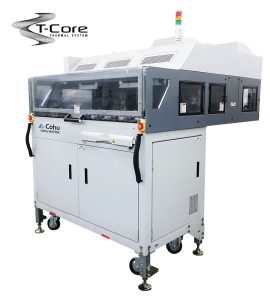The Dawn of Ultra-Low Power AI: A Game Changer for Wearables and Semiconductor Manufacturing
December 18, 2024, 5:37 pm

Location: United States, California, San Francisco
Employees: 501-1000
Founded date: 2011
Total raised: $215M

Location: United States, California, San Francisco
Employees: 1-10
Founded date: 2017
Total raised: $5M
In the fast-paced world of technology, innovation is the lifeblood that fuels progress. Two recent announcements highlight this truth, showcasing advancements in artificial intelligence (AI) that promise to reshape industries. Ambient Scientific has unveiled its first AI module powered by a coin cell battery, while Cohu, Inc. is set to enhance its data analytics capabilities through the acquisition of Tignis, Inc. Together, these developments signal a new era for AI applications in wearables and semiconductor manufacturing.
Ambient Scientific's Sparsh-board is a marvel of engineering. Imagine a tiny brain that can think and learn, yet runs on the power of a small coin cell battery. This ultra-low power AI module is designed for wearables and other battery-powered devices. It can recognize human activity, control voice commands, and detect sounds—all while sipping energy like a hummingbird at a flower. The Sparsh-board is equipped with motion sensors, a digital microphone, and Bluetooth Low Energy (BLE) capabilities, making it a versatile tool for developers.
The implications are vast. With the Sparsh-board, developers can create applications that are always on, providing real-time insights without draining the battery. This opens doors for innovations in health monitoring, smart home devices, and even toys that respond to voice commands. The potential for rapid prototyping is immense, allowing creators to turn ideas into reality with unprecedented speed.
Ambient Scientific's GPX10 processor is at the heart of this technology. It represents a paradigm shift in AI performance and power consumption. Traditional microcontrollers often force a compromise between efficiency and capability. The GPX10, however, uses groundbreaking analog in-memory computing technology to break this mold. It allows for highly accurate AI applications without sacrificing battery life or performance. This is akin to having a high-performance sports car that runs on the fuel efficiency of a compact sedan.
Moreover, Ambient Scientific is not just providing hardware; they are offering a comprehensive software stack. Their AmbiSense SDK supports popular AI frameworks like TensorFlow and Keras, making it easy for developers to dive into AI application development. With sample applications and algorithms readily available, the barrier to entry is lower than ever. This democratization of technology empowers enthusiasts, students, and researchers to explore the possibilities of AI.
On the other side of the tech landscape, Cohu, Inc. is making waves with its acquisition of Tignis, a company specializing in AI-driven process control and analytics for semiconductor manufacturing. This strategic move is not just about expanding Cohu's product portfolio; it’s about harnessing the power of AI to unlock efficiency in a $2.6 billion market. Tignis’ PAICe Monitor and PAICe Maker solutions leverage AI and machine learning to provide predictive and prescriptive automation. This is akin to having a crystal ball that can foresee manufacturing issues before they arise.
The semiconductor industry is undergoing a transformation, driven by Industry 4.0. Companies are increasingly turning to advanced analytics and AI to enhance productivity and yield. Cohu's acquisition of Tignis positions it to lead this charge. The integration of Tignis’ technology into Cohu’s DI-Core software will deepen their expertise in data science, allowing for more sophisticated analytics and process control.
Tignis’ unique Digital Twin Query Language (DTQL) simplifies complex data tasks, making advanced analytics accessible even to those without a data science background. This is a game changer for manufacturers who need to manage vast amounts of data but lack the resources to hire specialized talent. With Tignis on board, Cohu is poised to deliver solutions that not only improve manufacturing processes but also reduce costs and variability.
The synergy between Ambient Scientific and Cohu highlights a broader trend in the tech industry: the convergence of AI and hardware. As devices become smarter and more capable, the demand for efficient, low-power solutions will only grow. Ambient Scientific’s Sparsh-board and Cohu’s acquisition of Tignis are just two examples of how companies are rising to meet this challenge.
In conclusion, the unveiling of the Sparsh-board and Cohu's acquisition of Tignis represent significant milestones in the evolution of AI technology. These advancements are not just technical achievements; they are catalysts for change across industries. As we move into 2025, the landscape of wearables and semiconductor manufacturing will be forever altered. The future is bright, powered by ultra-low energy AI that is set to transform how we interact with technology. The dawn of this new era is upon us, and it promises to be nothing short of revolutionary.
Ambient Scientific's Sparsh-board is a marvel of engineering. Imagine a tiny brain that can think and learn, yet runs on the power of a small coin cell battery. This ultra-low power AI module is designed for wearables and other battery-powered devices. It can recognize human activity, control voice commands, and detect sounds—all while sipping energy like a hummingbird at a flower. The Sparsh-board is equipped with motion sensors, a digital microphone, and Bluetooth Low Energy (BLE) capabilities, making it a versatile tool for developers.
The implications are vast. With the Sparsh-board, developers can create applications that are always on, providing real-time insights without draining the battery. This opens doors for innovations in health monitoring, smart home devices, and even toys that respond to voice commands. The potential for rapid prototyping is immense, allowing creators to turn ideas into reality with unprecedented speed.
Ambient Scientific's GPX10 processor is at the heart of this technology. It represents a paradigm shift in AI performance and power consumption. Traditional microcontrollers often force a compromise between efficiency and capability. The GPX10, however, uses groundbreaking analog in-memory computing technology to break this mold. It allows for highly accurate AI applications without sacrificing battery life or performance. This is akin to having a high-performance sports car that runs on the fuel efficiency of a compact sedan.
Moreover, Ambient Scientific is not just providing hardware; they are offering a comprehensive software stack. Their AmbiSense SDK supports popular AI frameworks like TensorFlow and Keras, making it easy for developers to dive into AI application development. With sample applications and algorithms readily available, the barrier to entry is lower than ever. This democratization of technology empowers enthusiasts, students, and researchers to explore the possibilities of AI.
On the other side of the tech landscape, Cohu, Inc. is making waves with its acquisition of Tignis, a company specializing in AI-driven process control and analytics for semiconductor manufacturing. This strategic move is not just about expanding Cohu's product portfolio; it’s about harnessing the power of AI to unlock efficiency in a $2.6 billion market. Tignis’ PAICe Monitor and PAICe Maker solutions leverage AI and machine learning to provide predictive and prescriptive automation. This is akin to having a crystal ball that can foresee manufacturing issues before they arise.
The semiconductor industry is undergoing a transformation, driven by Industry 4.0. Companies are increasingly turning to advanced analytics and AI to enhance productivity and yield. Cohu's acquisition of Tignis positions it to lead this charge. The integration of Tignis’ technology into Cohu’s DI-Core software will deepen their expertise in data science, allowing for more sophisticated analytics and process control.
Tignis’ unique Digital Twin Query Language (DTQL) simplifies complex data tasks, making advanced analytics accessible even to those without a data science background. This is a game changer for manufacturers who need to manage vast amounts of data but lack the resources to hire specialized talent. With Tignis on board, Cohu is poised to deliver solutions that not only improve manufacturing processes but also reduce costs and variability.
The synergy between Ambient Scientific and Cohu highlights a broader trend in the tech industry: the convergence of AI and hardware. As devices become smarter and more capable, the demand for efficient, low-power solutions will only grow. Ambient Scientific’s Sparsh-board and Cohu’s acquisition of Tignis are just two examples of how companies are rising to meet this challenge.
In conclusion, the unveiling of the Sparsh-board and Cohu's acquisition of Tignis represent significant milestones in the evolution of AI technology. These advancements are not just technical achievements; they are catalysts for change across industries. As we move into 2025, the landscape of wearables and semiconductor manufacturing will be forever altered. The future is bright, powered by ultra-low energy AI that is set to transform how we interact with technology. The dawn of this new era is upon us, and it promises to be nothing short of revolutionary.

